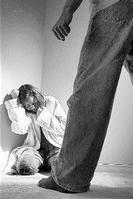Gareth Manning, Sunday Gleaner Reporter

AN increase in the number of women being physically abused by their partners has raised alarm among women's groups, putting added pressure on a health care system already crumbling under the weight of violent injuries.
Between 1995 and 1999, reports of spousal abuse have almost quadrupled.
According to Woman Inc., a non-governmental organisation that counsels battered women, it has jumped from 333 reports to over 1,150. Those reports increased at the turn of the century with the most recent data showing reports standing at 1,246.
MORE VIOLENT ASSAULTS
But abuse is still underreported.
According to Woman Inc., for every report of abuse, there are seven others that are not reported.
Where there are no reports, however, the treatment of injuries is boring a hole in the pocket of the health care sector.
Treatment of these injuries is estimated to cost the health sector in the region of $160 million. Treatment of all violent injuries reportedly costs the country $800 million.
Nearly 84 per cent of assault cases treated at hospitals are caused by persons known to their victims, the Ministry of Health reports. In nearly 20 per cent of these cases, injuries are caused by domestic disputes.
Thirty-nine per cent of those injuries are inflicted by intimate partners. There is fear that the assaults on women are becoming more violent.
"Reports are going up. But it's the situation whereby the beating, the abuse ... has become more violent and more traumatic. It has become more gruesome in that we've got the murder-suicides," Joyce Hewett, president of Woman Inc., told The Sunday Gleaner last week.
So far this year, there have been at least three cases of murder-suicide. The most recent involved a special constable in Spanish Town, who shot his girlfriend and then took his own life.
In February, another policeman committed a similar offence, and last year, there were three such cases.
Ms. Hewett, who is a psycho-logist, says part of the problem is men do not know how to deal with anger.
"When the stress is on and they are troubled and unable to release their anger and resentment, the thrust is not only on the partner but it is often turned on themselves in the end," she surmises.
Situation taken lightly
Ms. Hewett says while murder-suicide is not yet a trend, if it is not given attention urgently, it will become one soon. She blamed the spread of violence on lack of response of the community also, which she says often takes violent situations lightly.
"It is the people next door who see what's happening with these couples and their relationships and they still don't, in this day and age, take some kind of steps to intervene," she said.
She says communities should try counselling persons who appear to be having domestic disputes, and where that cannot be done, the police should be called in before the situation escalates.
As the number of cases of abused women increases, there is also more concern about where they can go for help. Hewett says the situation is now a crisis because there are not enough shelters to house battered women. As such, many women end up staying in abusive relationships because they have nowhere to go.
Nowhere to go
Rue, an unemployed mother of three living in a rural town, is one such woman. She has been trying to get away from her abusive common-law husband for years. But she stays because he is the only source of income for her and her children. He has beaten her several times and she says he sometimes forces her to have sex.
"If me did have somewhere, me would a lef' now," she said in a 2004 interview. Today, she is still unemployed and living with her husband because there is nowhere to turn.
The Crisis Centre run by Woman Inc. is the only shelter for battered women in the island. This is despite the signing of two conventions by Government: the Convention on the Elimination of all forms of Discrimination Against Women in 1988 and the Convention of Belem do Para, which was signed earlier this year.
Both are supposed to protect women against abuse and discrimination, as well as provide shelter for victims of abuse in the 14 parishes.
So far, commitments to these conventions have not been kept.
"Every woman has a right to a safe place. She must be able to go somewhere where she is not under threat for her life and any kind of serious injury," Ms. Hewett said.
Besides the lack of shelters, Hewett is also concerned that there are no rehabilitation groups or facilities for abusive men. She says this is critical to ending the cycle of spousal abuse.
"We need to address the need to deal with men from an early age. It is not there, and that is what is lacking," she said.
Name withheld.
Source: Woman Inc.
The situation is now a crisis
because there are not enough shelters
to house battered women.

